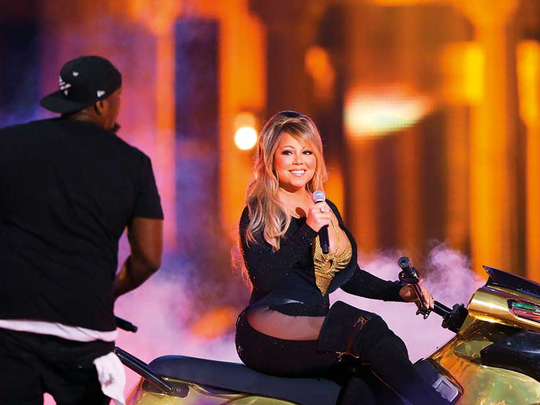
Twenty years ago, Butterfly changed Mariah Carey’s career. It also helped change pop music.
VH1 recognised Mariah Carey for her many hip-hop collaborations at this year’s Hip Hop Honors, which were held on September 17, and the timing couldn’t be better.
Twenty years ago this month, Carey released Butterfly. The album, which hit shelves September 16, 1997, marked a pivotal moment in Carey’s career, not least because it followed her very public split from Sony music exec Tommy Mottola. The title was symbolic — Carey was coming into her own. Her clothing style grew noticeably sexier. She was more playful with her fans, more frank in interviews. But most importantly, the album introduced Carey, largely considered a pop singer, as a veritable hip-hop collaborator.
TAKING FLIGHT
Butterfly found Carey working with hip-hop heavyweights including Sean “Puffy” Combs (now known as Diddy), Q-Tip, Stevie J and Missy Elliott. She had dabbled in the genre on her previous album, Daydream, which featured multiple collaborations with So So Def founder Jermaine Dupri and R&B hit maker Kenneth “Babyface” Edmonds. Carey famously recruited Wu Tang Clan for the remix to her 1995 single Fantasy, her first co-effort with Combs.
With guest verses from Bone Thugs-n-Harmony, Mase, The Lox and Mobb Deep, Butterfly proved Carey was more than comfortable in the hip-hop space. Collaborating with rappers had been commonplace for R&B singers, including Faith Evans, Mary J. Blige and Total in the mid-90s, but it was relatively new terrain for pop stars. Butterfly — and Carey’s subsequent collaborations with rappers including Jay-Z, Nas, Cam’ron and Snoop Dogg — helped pave the way for other pop stars (looking at you Ariana Grande, Justin Timberlake and Katy Perry) to sing alongside their rap contemporaries.
Butterfly debuted at No 1 on the Billboard 200 chart, with Honey, the album’s lead single, becoming Carey’s 12th song to hit No. 1 on Billboard’s Hot 100. My All, which spawned a remix featuring of-the-moment duo Lord Tariq and Peter Gunz, also spent one week atop the list.
CRITICAL RECEPTION
Despite generally favourable reviews, some critics were clearly sceptical of Carey’s supposedly new sound. In his review for The Washington Post, Richard Harrington declared “there are two Mariah Careys on ‘Butterfly.’ “
“One is the pop-oriented, ballad-leaning traditionalist who works very effectively with her longtime professional partner, composer-producer Walter Afanasieff,” he wrote. “The other is a self-styled hip-hop fanatic.”
By all accounts, Carey was prepared for the backlash. Doing ‘Fantasy with ODB in ’95 was not exactly a pop move,” she says in Mariah #1s, a collection of music videos that was released on DVD in 2000. “This was way before ‘Ghetto Supastar,’ “ she adds, citing the 1998 collaboration between Pras, singer Mya and ODB. “I was just a fan of Wu Tang, and I was a fan of his.”
Working with hardcore rap duo Mobb Deep in 1997 wasn’t exactly a pop move either. The group appeared on the remix for Butterfly’s third single The Roof, which sampled the group’s 1995 song Shook Ones (Part II).
If critics — or fans — took a cynical view of Carey’s affinity for hip-hop, they simply weren’t paying attention to her discography (see: Fantasy, Long Ago) or her background (a multiracial woman who spent formative years in New York City, the birthplace of hip-hop).
“I’ve done things in the past that I felt really good about that weren’t necessarily released, so now people are like, ‘oh, she’s jumping on the hip-hop bandwagon,’ “ the singer told Trace Magazine in 1998. “I think it’s ridiculous.”
The bandwagon perception also ignored the fact that working with Carey was a huge milestone for the rappers she collaborated with.
“I was still a young kid — I was really in awe of Mariah,” Jadakiss told Billboard of recording the Honey remix.
“When I heard it I was just really excited,” his former Lox group mate Styles P, told the site. “For a rapper to be able to get on a song with Mariah Carey, for it to be the kind of beat you could actually enjoy rapping over, that makes for a great session. Makes your job easier.”
This year’s Hip Hop Honors ceremony focused on artists who made significant contributions to hip-hop culture in the 90s, and Carey — who has continued to write, produce and perform alongside rappers and well-respected hip-hop producers — certainly fits the bill. It’s refreshing to see her get recognised for an important but often overlooked aspect of her legacy.












